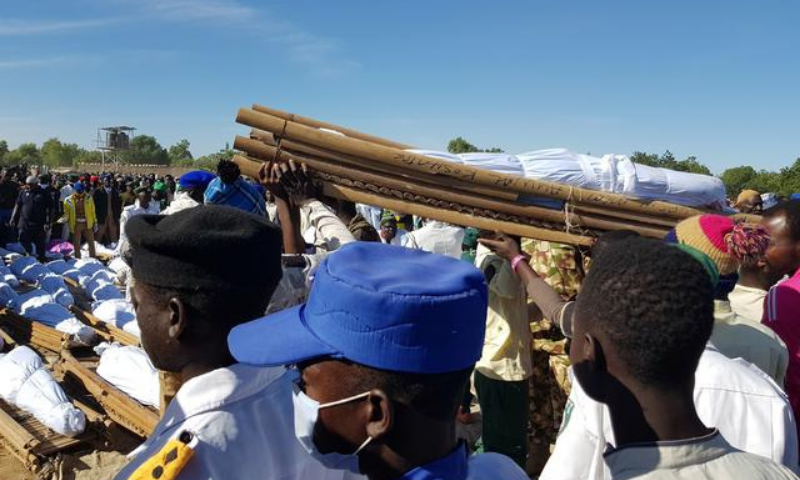MAIDUGURI: A weekend attack on farm workers in northeast Nigeria blamed on the Boko Haram terrorist group left at least 110 dead, the UN humanitarian coordinator in the country said on Sunday.
“At least 110 civilians were ruthlessly killed and many others were wounded in this attack,” Edward Kallon said in a statement, after initial tolls indicated 43 and then at least 70 people died in Saturday’s massacre by suspected Boko Haram fighters.
“The incident is the most violent direct attack against innocent civilians this year,” Kallon said, blaming “non-state armed groups” without naming Boko Haram.
“I call for the perpetrators of this heinous and senseless act to be brought to justice,” he added.
The conflict has claimed over 36,000 lives since 2009
The bloodletting centred on the village of Koshobe near the Borno state capital Maiduguri, with assailants targeting farm workers on rice fields, with a pro-government anti-militant militia saying the assailants tied up the labourers and slit their throats.
Kallon said the assailants — “armed men on motorcycles” — also targeted other communities in the area.
Borno Governor Babaganan Umara Zulum attended the burial on Sunday in the nearby village of Zabarmari of 43 bodies recovered on Saturday, saying the toll could rise after search operations resumed.
The victims included dozens of labourers from Sokoto state in northwestern Nigeria, roughly 1,000 kilometres away, who had travelled to the northeast to find work, it said.
Six were wounded in the attack and eight remained missing as of Saturday. Kallon, citing “reports that several women may have been kidnapped”, called for their immediate release.
Nigerian President Muhammadu Buhari condemned the attack on Saturday, saying: “The entire country has been wounded by these senseless killings.”
The attack took place as voters went to the polls in long-delayed local elections in Borno State.
The polls had been repeatedly postponed because of an increase in attacks by Boko Haram and a rival dissident faction, the IS-affiliated Islamic State West Africa Province (ISWAP).
The two groups have been blamed for increasing attacks on loggers, farmers and fishermen whom they accuse of spying for the army and pro-government militia.
Last month Boko Haram militants slaughtered 22 farmers working on their irrigation fields near Maiduguri, in two separate attacks.
At least 36,000 people have been killed in the conflict, which has forced around two million people to flee their homes since 2009.
The violence has also spread into neighbouring Niger, Chad and Cameroon, prompting a regional military coalition to fight the militants.
Published in Dawn, November 30th, 2020














































